
Photograph Source: Heidi De Vries from Berkeley, CA – CC BY 2.0
“If life isn’t a mystery, then what the fuck is it??”
–Paul Krassner
I can’t remember exactly where or when I first met Paul Krassner, but it had to have been in the mid-1980s, and was almost certain to have been at a local club where Paul was doing stand-up comedy, performing before tiny but greatly appreciative audiences.
I must have talked to him after the show, and we sort of hit it off. Anyway, over the years the two personal things that I most remember about him were his wonderful generosity and his keen and totally understandable interest in earning money.
Not that every writer isn’t looking to be compensated, but in Paul Krassner’s case—having never had a “real” payroll-type job or a decent medical or dental plan—getting paid meant everything.
We all have known wealthy people. But considering that Paul had more talent—more creativity, more wit, more wisdom, and more common decency—in his left nut than these rich folks had in their entire bodies, him being “poor” was an outrage. One is reminded of the Dorothy Parker quote: “If you want to know what God thinks of money, just look at the people He gave it to.”
Not that I was a prolific writer, but every time I got something published Paul wanted to know if I had gotten paid for it, and if I had, how much it was, because he wanted to add that particular publication to his list of places that paid. Writers don’t like telling citizens what they got paid for a piece, but they’ll always tell another writer.
I once wrote a labor piece for the op-ed page of the Los Angeles Times. Paul saw it and asked me how much I’d gotten paid. This was easily 20 years ago, probably longer. I still recall exactly how much because it was a big deal to get an op-ed piece printed in a major newspaper. It was $300 for a roughly 700-word piece. Paul was pleased to hear it.
Paul went out of his way to get me published in the old New York Press. I had done an interview with Mort Sahl that the LA Times Calendar Section was interested in, but at the last minute they decided to pass on it, which irked me because I was counting on it.
I whined to Paul about it. He knew the NY Press editor, told me to query him about the article, and to be sure to use his name as a reference. Which I did. Thanks to Paul’s generosity, the interview was published and I was paid.
In 1978 he was brutally beaten by a San Francisco cop during the “White Riot” following the Dan White sentencing for the murder of George Moscone and Harvey Milk. In truth, it was more a “protest” than a riot. It was the maniacal and ferocious response of the local police that turned it into a riot.
Paul suffered a serious injury. And not having any health insurance, and believing that he was still young and spry enough for the brutal attack to heal itself, he didn’t seek medical assistance. It turned out to be an unwise move. The shattered bone never healed properly, and he was left with a severe and painful limp.
During one of his last public appearances, doing stand-up at a tiny club in LA, he stumbled and fell hard as he entered the stage. The audience gasped. But Paul was not only able to leap to his feet, when he reached the mic, he relaxed the audience by making a joke of it. “I want you all to know…I do that on purpose,” he said. “It’s a great way to get sympathy.”
Rest in peace, my friend. There will never be another one like you.